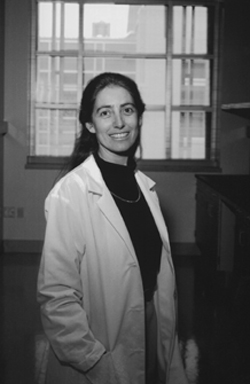Scientists have been trying to outsmart bacteria for a long time in vain. Bacteria have been the ones to come up with ingenious ways to sidestep antibiotic attack by developing immunity to it, leading to doomsday theories on just when antibiotics won't be effective anymore.
This is precisely why a discovery by microbiologist Dr. Naomi Balaban, Feinberg Graduate School graduate, and now a microbiologist at University of California at Davis, has caused tremendous excitement worldwide. Balaban has found a way to circumvent the need for antibiotics when dealing with the potent Staphylococcus bacteria, which is responsible for 70,000 deaths yearly in America alone. Having created a whole new outlook on tackling bacteria, her method may prove useful in fighting other kinds of bacteria as well.
The problem in finding alternatives to antibiotics, she says, was the age-old strategic loophole underestimating one's enemy. "Scientists always thought bacteria were passive reacting to cramped conditions, yet not initiating any actions on their own. But I wondered how that could be, given the fact that they are such great survivors."
And so she set out to see whether bacteria were indeed all that, well, dim-witted. Her findings proved her suspicions were wellfounded. Balaban discovered that bacteria send out "scouts," called RAP, to check out the territory. The scouts are the eyes, ears and feelers of the bacteria: Without them, bacteria have no indication of their surroundings or whether their food supply is running low. Picking up signals from neighboring bacteria, they relay a message back to the bacteria warning that conditions are beginning to look uncomfortable.
Once a message indicating cramped conditions is sent to the bacterium, it gets out of this tight spot by chewing away at surrounding tissue (that means us), thus enlarging its space and food supply.
Balaban also found a way to neutralize the scouts. Since the scouts are the only "feelers" the bacterium has, neutralizing them means leaving the bacterium in a state of false bliss, without knowledge of its increasingly cramped surroundings. The bacterium leaves surrounding tissue alone, and infections are prevented.
Even during its final, unnourished moments, the bacterium doesn't realize that anything is amiss. And it doesn't have a chance to mutate into a stronger breed, i.e., doesn't develop immunity, as it would with antibiotics.
Balaban began studying at the Weizmann Institute in 1985, earning her Ph.D. in 1991 under the supervision of Dr. Rachel Goldman. She did her postdoctoral studies at New York University under the supervision of Prof. Richard Novick.
"The Weizmann Institute gave me the opportunity to be unconventional and to carry out my own ideas. That definitely set the stage for what I'm doing today. At the Weizmann Institute, which is small yet encompasses so many disciplines, ideas are frequently born just by bumping into someone. The Feinberg Graduate School is simply the best of the best."
